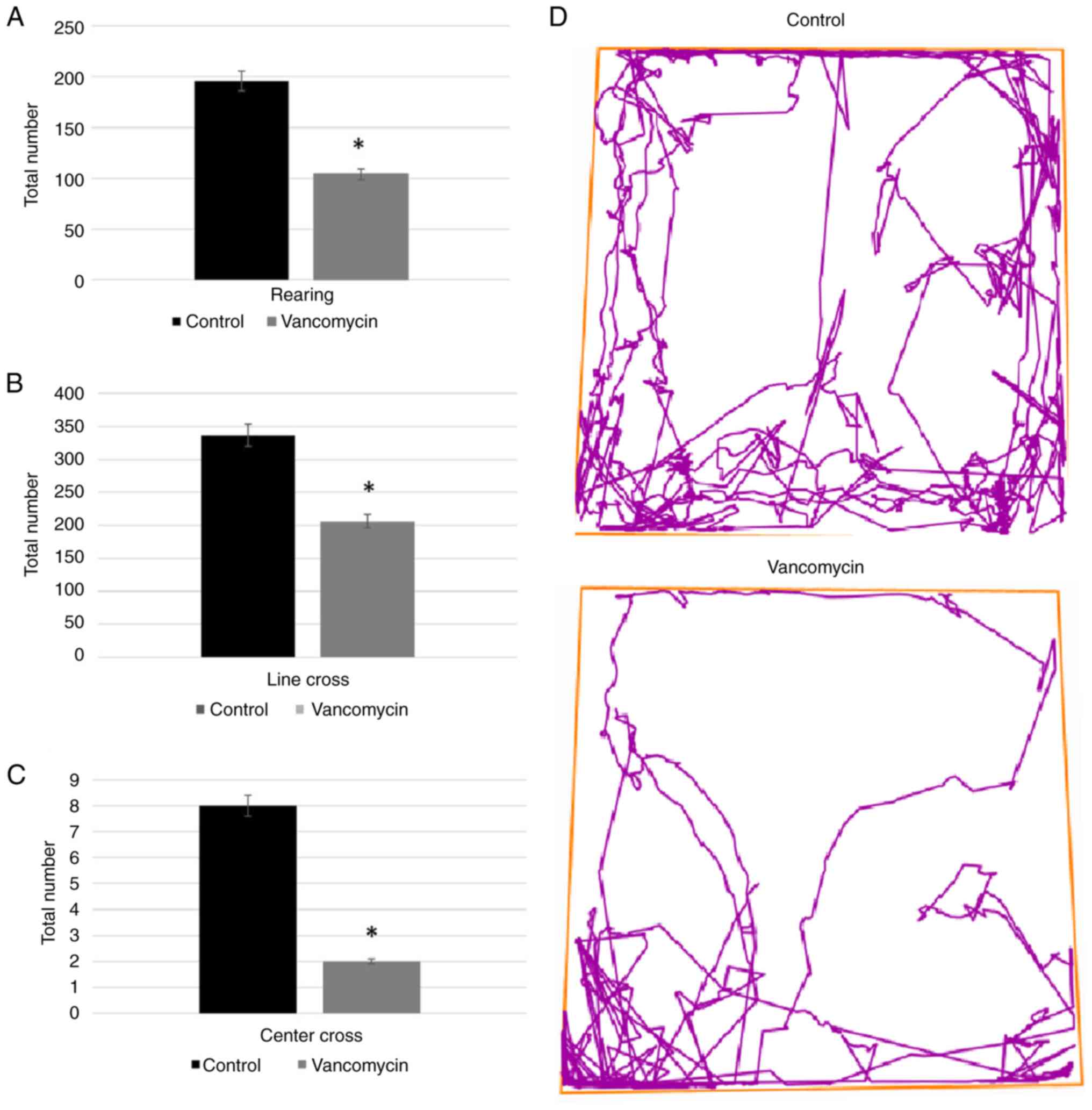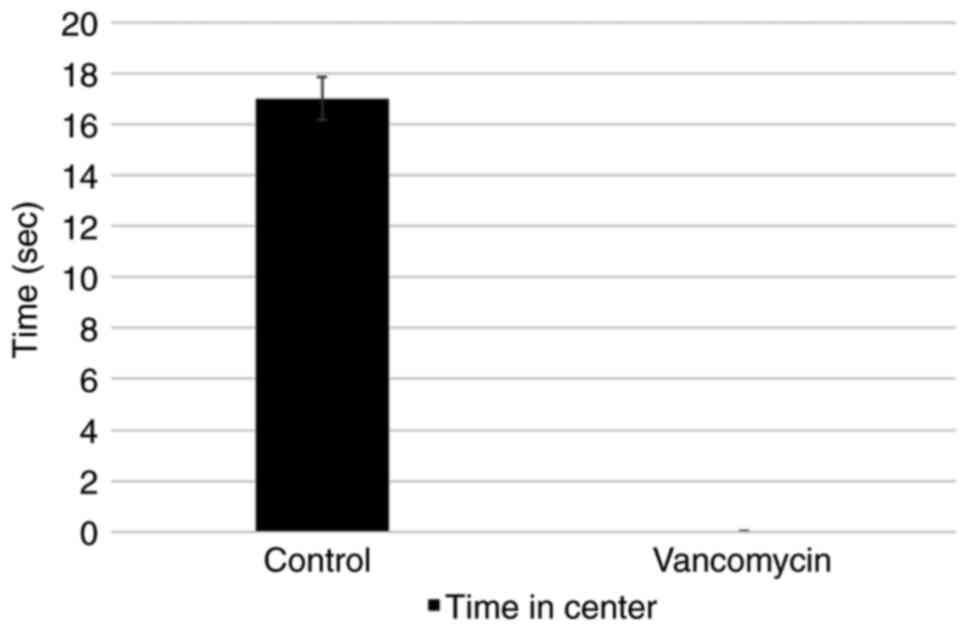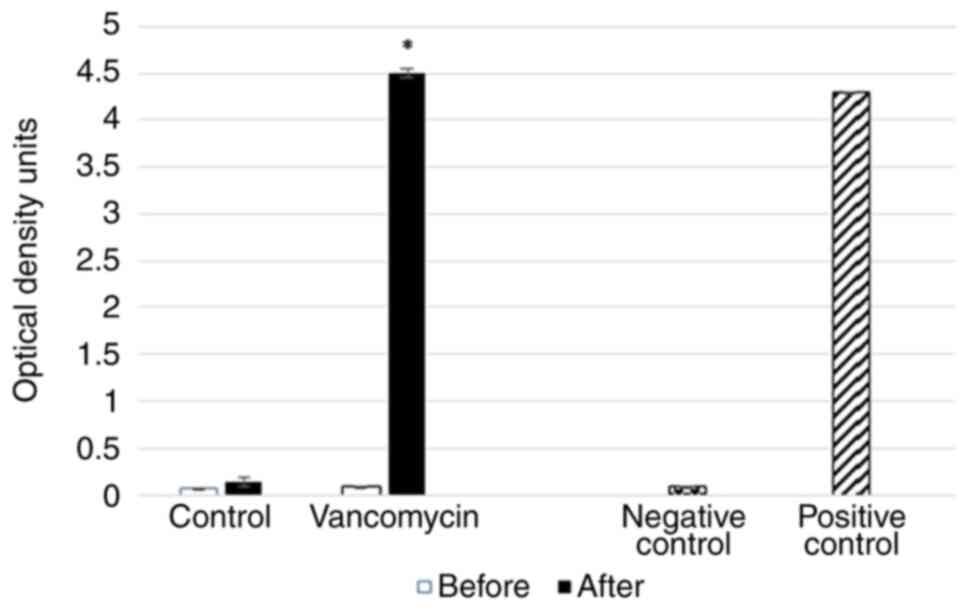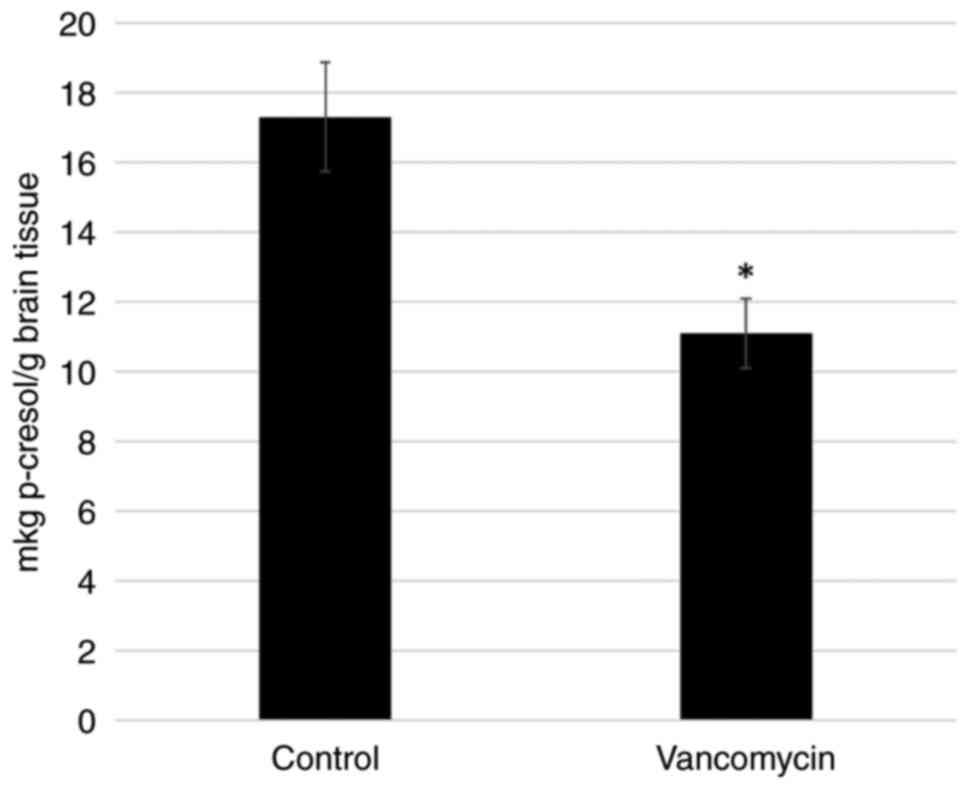|
1
|
Russell WR, Duncan SH, Scobbie L, Duncan
G, Cantlay L, Calder AG, Anderson SE and Flint HJ: Major
phenylpropanoid-derived metabolites in the human gut can arise from
microbial fermentation of protein. Mol Nutr Food Res. 57:523–535.
2013.PubMed/NCBI View Article : Google Scholar
|
|
2
|
Lin L and Zhang J: Role of intestinal
microbiota and metabolites on gut homeostasis and human diseases.
BMC Immunol. 18(2)2017.PubMed/NCBI View Article : Google Scholar
|
|
3
|
Persico AM and Napolioni V: Urinary
p-cresol in autism spectrum disorder. Neurotoxicol Teratol.
36:82–90. 2013.PubMed/NCBI View Article : Google Scholar
|
|
4
|
Saito Y, Sato T, Nomoto K and Tsuji H:
Identification of phenol- and p-cresol-producing intestinal
bacteria by using media supplemented with tyrosine and its
metabolites. FEMS Microbiol Ecol. 94(fiy125)2018.PubMed/NCBI View Article : Google Scholar
|
|
5
|
Morinaga Y, Fuke C, Arao T and Miyazaki T:
Quantitative analysis of cresol and its metabolites in biological
materials and distribution in rats after oral administration. Leg
Med (Tokyo). 6:32–40. 2004.PubMed/NCBI View Article : Google Scholar
|
|
6
|
Gabriele S, Sacco R, Cerullo S, Neri C,
Urbani A, Tripi G, Malvy J, Barthelemy C, Bonnet-Brihault F and
Persico AM: Urinary p-cresol is elevated in young French children
with autism spectrum disorder: A replication study. Biomarkers.
19:463–470. 2014.PubMed/NCBI View Article : Google Scholar
|
|
7
|
Tevzadze G, Shanshiashvilli L and
Mikeladze D: Children with epilepsy and autistic spectrum disorders
show similarly high levels of urinary p-cresol. J Biol Phys Chem.
17:77–80. 2017.
|
|
8
|
DeWolf WE Jr, Carr SA, Varrichio A,
Goodhart PJ, Mentzer MA, Roberts GD, Southan C, Dolle RE and Kruse
LI: Inactivation of dopamine .beta.-hydroxylase by p-cresol:
Isolation and characterization of covalently modified active site
peptides. Biochemistry. 27:9093–9101. 1988.PubMed/NCBI View Article : Google Scholar
|
|
9
|
Goodhart PJ, DeWolf WE and Kruse LI:
Mechanism-based inactivation of dopamine beta.-hydroxylase by
p-cresol and related alkylphenols. Biochemistry. 26:2576–2583.
1987.PubMed/NCBI View Article : Google Scholar
|
|
10
|
Sun Z, Bo Q, Mao Z, Li F, He F, Pao C, Li
W, He Y, Ma X and Wang C: Reduced plasma dopamine-β-hydroxylase
activity is associated with the severity of bipolar disorder: A
pilot study. Front Psychiatry. 12(566091)2021.PubMed/NCBI View Article : Google Scholar
|
|
11
|
Robinson PD, Schutz CK, Macciardi F, White
BN and Holden JJA: Genetically determined low maternal serum
dopamine b-hydroxylase levels and the etiology of autism spectrum
disorders. Am J Med Genet. 100:30–36. 2001.PubMed/NCBI View Article : Google Scholar
|
|
12
|
Perkovic MN, Erjavec GN, Stefulj J,
Muck-Seler D, Pivac N, Hercigonja DK, Hranilovic D, Curkovic M and
Dodig-Curkovic K: Association between the polymorphisms of the
selected genes encoding dopaminergic system with ADHD and autism.
Psychiatry Res. 215:260–261. 2014.PubMed/NCBI View Article : Google Scholar
|
|
13
|
Peláez T, Alcalá L, Alonso R,
Rodríguez-Créixems M, García-Lechuz JM and Bouza E: Reassessment
of Clostridium difficile susceptibility to metronidazole and
vancomycin. Antimicrob Agents Chemother. 46:1647–1650.
2002.PubMed/NCBI View Article : Google Scholar
|
|
14
|
Johnson S: Recurrent Clostridium
difficile infection: A review of risk factors, treatments, and
outcomes. J Infect. 58:403–410. 2009.PubMed/NCBI View Article : Google Scholar
|
|
15
|
Settanni CR, Bibbò S, Ianiro G, Rinninella
E, Cintoni M, Mele MC, Cammarota G and Gasbarrini A:
Gastrointestinal involvement of autism spectrum disorder: Focus on
gut microbiota. Expert Rev Gastroenterol Hepatol. 15:599–622.
2021.PubMed/NCBI View Article : Google Scholar
|
|
16
|
Alharthi A, Alhazmi S, Alburae N and
Bahieldin A: The human gut microbiome as a potential factor in
autism spectrum disorder. Int J Mol Sci. 23(1363)2022.PubMed/NCBI View Article : Google Scholar
|
|
17
|
Tevzadze G, Barbakadze T, Kvergelidze E,
Zhuravliova E, Shanshiashvili L and Mikeladze D: Gut neurotoxin
p-cresol induces brain-derived neurotrophic factor secretion and
increases the expression of neurofilament subunits in PC-12 cells.
AIMS Neurosci. 9:12–23. 2021.PubMed/NCBI View Article : Google Scholar
|
|
18
|
Saribas Z, Ergun H, Mamuk S, Köseoglu-Eser
O and Melli M: Critical appraisal of air pouch infection model in
rats. Ann Clin Lab Sci. 42:50–56. 2012.PubMed/NCBI
|
|
19
|
Gonzales M, Pepin J, Frost EH, Carrier JC,
Sirard S, Fortier LC and Valiquette L: Faecal pharmacokinetics of
orally administered vancomycin in patients with suspected
Clostridium difficile infection. BMC Infect Dis.
10(363)2010.PubMed/NCBI View Article : Google Scholar
|
|
20
|
Rajizadeh MA, Sheibani V, Bejeshk MA,
Borzadaran FM, Saghari H and Esmaeilpour K: The effects of high
intensity exercise on learning and memory impairments followed by
combination of sleep deprivation and demyelination induced by
etidium bromide. Int J Neurosci. 129:1166–1178. 2019.PubMed/NCBI View Article : Google Scholar
|
|
21
|
Rajizadeh MA, Esmaeilpour K,
Masoumi-Ardakani Y, Bejeshk MA, Shabani M, Nakhaee N, Ranjbar MP,
Borzadaran FM and Sheibani V: Voluntary exercise impact on
cognitive impairments in sleep-deprived intact female rats. Physiol
Behav. 188:58–66. 2018.PubMed/NCBI View Article : Google Scholar
|
|
22
|
Esmaeilpour K, Sheibani V, Shabani M and
Mirnajafi-Zadeh J: Low frequency electrical stimulation has time
dependent improving effect on kindling-induced impairment in
long-term potentiation in rats. Brain Res. 1668:20–27.
2017.PubMed/NCBI View Article : Google Scholar
|
|
23
|
Iulita MF, Allard S, Richter L, Munter LM,
Ducatenzeiler A, Weise C, Do Carmo S, Klein WL, Multhaup G and
Cuello AC: Intracellular Aβ pathology and early cognitive
impairments in a transgenic rat overexpressing human amyloid
precursor protein: A multidimensional study. Acta Neuropathol
Commun. 2(61)2014.PubMed/NCBI View Article : Google Scholar
|
|
24
|
Lueptow LM: Novel object recognition test
for the investigation of learning and memory in mice. J Vis Exp.
126(55718)2017.PubMed/NCBI View
Article : Google Scholar
|
|
25
|
Ennaceur A: One-trial object recognition
in rats and mice: Methodological and theoretical issues. Behav
Brain Res. 215:244–254. 2010.PubMed/NCBI View Article : Google Scholar
|
|
26
|
Public Health England. Clostridioides
difficile: guidance, data and analysis. Available from:
https://www.gov.uk/government/collections/clostridium-difficile-guidance-data-and-analysis.
|
|
27
|
Krijger IM, Meerburg BG, Harmanus C and
Burt SA: Clostridium difficile in wild rodents and
insectivores in the Netherlands. Lett Appl Microbiol. 69:35–40.
2019.PubMed/NCBI View Article : Google Scholar
|
|
28
|
Chiu CY, Sarwal A, Feinstein A and
Hennessey K: Effective dosage of oral vancomycin in treatment for
initial episode of clostridioides difficile infection: A
systematic review and meta-analysis. Antibiotics.
8(173)2019.PubMed/NCBI View Article : Google Scholar
|
|
29
|
Nazzal L, Soiefer L, Chang M, Tamizuddin
F, Schatoff D, Cofer L, Aguero-Rosenfeld ME, Matalon A, Meijers B,
Holzman R and Lowenstein J: Effect of vancomycin on the gut
microbiome and plasma concentrations of gut-derived uremic solutes.
Kidney Int Rep. 6:2122–2133. 2021.PubMed/NCBI View Article : Google Scholar
|
|
30
|
Koyama N, Inokoshi J and Tomoda H:
Anti-infectious agents against MRSA. Molecules. 18:204–224.
2012.PubMed/NCBI View Article : Google Scholar
|
|
31
|
Kirk JA, Banerji O and Fagan RP:
Characteristics of the Clostridium difficile cell envelope
and its importance in therapeutics. Microb Biotechnol. 10:76–90.
2017.PubMed/NCBI View Article : Google Scholar
|
|
32
|
Eubank TA, Gonzales-Luna AJ, Hurdle JG and
Garey KW: Genetic mechanisms of vancomycin resistance in
clostridioides difficile: A systematic review. Antibiotics
(Basel). 11(258)2022.PubMed/NCBI View Article : Google Scholar
|


















